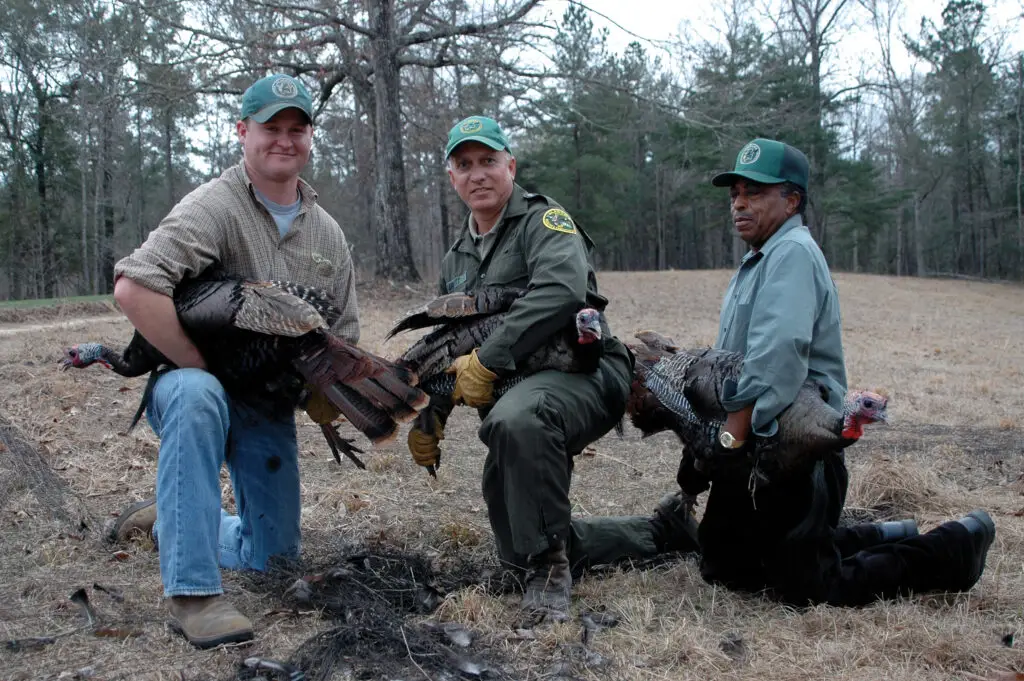Alabama sportsmen might need to work a little harder to bag their turkeys this spring. Populations of the magnificent birds declined for more than a decade.

“Based on our 2023 annual Avid Turkey Hunter Survey and our statewide brood surveys, there isn’t much positive news about the turkey population,” says Steven Mitchell, an Alabama Wildlife and Freshwater Fisheries Division wildlife biologist. “There was no significant increase in observations of jakes in 2023 compared to 2022.”
No increase in jakes, or immature males, from 2023 means fewer adult gobblers this year. During the 2023 season, about 69,000 hunters bagged an estimated 47,000 gobblers. In the 2022 spring season, 71,000 hunters harvested about 36,000 turkeys, compared to 58,000 hunters bagging 25,300 birds in 2021.
“We believe habitat loss is the number one reason for the declining turkey population,” Mitchell says. “Across Alabama, some places had good acorn crops in 2023 and some didn’t. In areas with good acorn crops, turkeys should be in good condition going into the spring. On properties with active habitat management for wild turkeys, the population should be better.”
To sustain a healthy population, two adults must produce at least two offspring. For more than a decade, turkey production registered considerably less than that. In 2021, turkeys produced 1.81 poults, or young birds, per hen. In 2022, that number dropped to 1.67 poults and declined again in 2023.
“All our surveys point to a decline in the Alabama turkey population,” Mitchell says. “The 2023 annual brood surveys resulted in an average of 1.26 poults observed per hen, which is terrible. Typically, a hen will nest once a year, but she could renest if the first nest gets destroyed. During the first nesting, she averages 11 to 12 eggs, but less in the second attempt.”
Predators, including bobcats and coyotes, eat turkeys, but tiny poults remain most vulnerable to numerous predators including owls, hawks and foxes. Even some animals not traditionally considered predators can impact turkey populations by destroying nests and eating eggs.
“Everything loves to eat a turkey,” Mitchell says. “If a raccoon can catch a poult, it will eat it, but raccoons are the number one egg eaters. Armadillos, opossums and some snakes also eat eggs. We always recommend trapping with any wildlife management plans, but it’s not a silver bullet. Habitat will always be number one.”
Predators and turkeys coexisted for eons. With good habitat, the species can survive the onslaught. Turkeys thrive in a mix of pine and hardwood forests. They also need weedy fields to provide cover to poults and insects to eat.
“Turkeys need early successional brood habitat and weeds,” Mitchell says. “Weeds are very important to poults and young turkeys. It gives them a little protection and attracts a lot of bugs. Poults are fully dependent upon bugs for their first two weeks of life. They need that protein content.”
Grassy strips called “daylighting” next to roads also help turkeys. Cut the trees back from the roads to allow more sunlight to reach the ground so native vegetation can sprout. That also helps roads dry quicker after storms. Let the strip grow fallow to provide poults with cover and food. Some people plant these strips with foods for turkeys and other animals.
Many land managers plant food plots for deer. These plots can produce good turkey brood habitat if the managers allow them to become overgrown with weeds after deer season ends. Landowners can contact their local wildlife office to ask for technical assistance to better manage their properties.
On most wildlife management areas, the state does extensive habitat work to manage for all species, particularly deer and turkeys. Some better public turkey hunting properties include Barbour, Black Warrior, the Geneva State Forest, James D. Martin-Skyline, Perdido River, Red Hills and Upper Delta WMAs.
People who kill a wild turkey must report it to Game Check. Also, sportsmen might volunteer to participate in the Avid Turkey Hunter Surveys. For more information or to volunteer, contact Brandon Earls, the state upland game bird coordinator, at 334-868-1608 or email [email protected].
“Information gathered from hunters in the Avid Turkey Hunter Surveys is important,” Earls says. “We collect such information as the number of gobblers hunters hear and when, number of turkeys observed and harvest information. Every piece of information we can get from hunters helps us better manage turkeys in Alabama.”
For information on season dates, zone boundaries and regulations, see outdooralabama.com/seasons-and-bag-limits/turkey-season.
John N. Felsher is a professional freelance writer who lives in Semmes, Ala. He also hosts an outdoors tips show for WAVH FM Talk 106.5 radio station in Mobile, Ala. Contact him at [email protected] or through Facebook.




